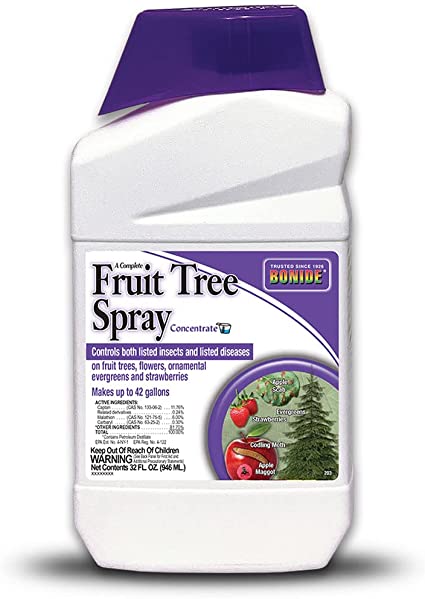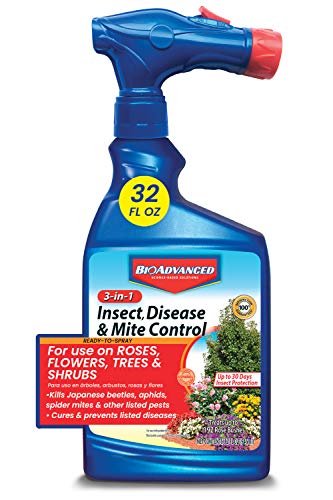Insecticide For Cherry Trees
As it grows, a cherry tree may experience issues caused by pests or diseases. Factors such as location, weather, and upkeep play a part in which issues your cherry tree encounters and how well it stands up against them. Disease-resistant cherry trees are easy-care options for growers who prefer a low-spray or no-spray orchard, and – for all cherry trees – routine maintenance* can help keep most problems at bay.
*Examples of good practices are: adequate watering, fertilizing only as needed, seasonal pruning, preventative and active spraying, fall cleanup and winter protection.
The following are merely intended as a means of identifying potential issues. Don’t be alarmed – a cherry tree may experience a few of these in its lifetime, but certainly not all at once.
Cherry Tree Pests
Aphids
Tiny, pinhead-sized insects, varying in color depending on the type. Will cluster on stems and under leaves, sucking plant juices.
Symptoms: Leaves curl, thicken, yellow, and die. Aphids produce large amounts of a sticky residue called “honeydew” that attracts insects like ants. Honeydew also becomes a growth medium for sooty mold.
Control: Spray
- GardenTech® Sevin® Concentrate Bug Killer
- Monterey Fruit Tree Spray Plus
Control: Natural Spray
- Monterey Fruit Tree Spray Plus
- Monterey Horticultural Oil
- Safer® Brand Insect Killing Soap
- Monterey Complete Disease Control
- Natural Guard® Neem
- Ferti-lome® Triple Action
Cherry Fruit Fly
Adults are similar in appearance to a housefly, but smaller. Larvae are yellowish-white grubs. Traps are an option for luring adults.
Symptoms: Small, pinpoint-sting marks visible on fruit surface. Eggs are laid under fruit skin. Hatched larvae tunnel, making railroad-like mining pattern.
Control: Spray
- Monterey Fruit Tree Spray Plus
Control: Natural Spray
- Hi-Yield® Vegetable & Ornamental Insect Control
- Monterey Fruit Tree Spray Plus
- Ferti-lome® Triple Action
Moths
Includes: Orange Tortrix, Oriental Fruit Moth, Codling Moth, Winter Moth, Western Tussock Moth, Cherry Scallop Shell Moth, etc.
Adults are moths that vary in size and appearance. Larvae are pinkish-white with a red-brown head, about ½-inch long. Pheromone traps are an option for luring moths.
Symptoms: Damage first appears on vegetative growth, and left untreated will eventually infest fruit. Larvae tunnel in through the stem and often exit near the pit.
Control: Spray
- Monterey Fruit Tree Spray Plus
- GardenTech® Sevin® Bug Killer
Control: Natural Spray
- Monterey Fruit Tree Spray Plus
- Hi-Yield® Vegetable & Ornamental Insect Control
- Monterey Fruit Tree Spray Plus
- Ferti-lome® Triple Action
- Natural Guard® Caterpillar Killer Spray w/BT
Borers
Includes: American plum borer, Pacific flatheaded borer, Peach twig borer, Peachtree borer, Shot hole borer
Adults are small brown beetles that may target the graft location (in young cherry trees) for laying eggs as well as damaged or sunken areas. Grubs have horseshoe-shaped heads and cream-colored bodies. Difficult to control once infested. Preventative spraying (including the ground around the roots) is a strong defense. Traps – in the form of tanglefoot-coated logs or posts that are later removed from the site and burned – are an option for luring adults.
Symptoms: A thick, gummy substance (sap) leaking from round holes on the trunk or in a crotch of the tree. Grubs tunnel through trunks, weakening and eventually killing the tree. Eggs hatch and larvae tunnel into tree’s vascular tissue.
Control: Manual
- If infested, use a fine wire to try to pierce, mash, or dig grubs out.
- Traps (tanglefoot-coated logs or posts) can lure adults. Remove from site and burn after trapping.
- Preventive spraying (including the ground around the roots)
Control: Spray
- GardenTech® Sevin® Concentrate Bug Killer
Additional Resources
- Contact local county Cooperative Extension for further advice
Japanese Beetle
Adult is a metallic-green beetle, which skeletonizes leaves. Larvae are cream-colored grubs that feed on turf roots prior to maturity. Turf pest-control may help reduce grub populations; check turf product labels for timing and control of grubs. Traps are an option for luring adult beetles.
Symptoms: Adults are often seen in groups – large infestations can cause stunted growth and stress by skeletonizing a majority of the leaves.
Control: Manual
- If infestation is minimal, knock Japanese beetles into a jar of soapy water solution (they will become immobile when frightened as a defense mechanism)
Control: Spray
- Monterey Fruit Tree Spray Plus
- GardenTech® Sevin® Bug Killer
Control: Natural Spray
- Hi-Yield® Vegetable & Ornamental Insect Control
Leafhopper
Small, active, slender-winged insect appearing in various colors. Usually found on undersides of leaves.
Symptoms: Slows new growth; leaves become whitened, stippled, or mottled. Leaf tips may wither and die. Prone to carrying diseases to and from plants and trees; damaged caused by leafhoppers may be greater than the feeding done directly by the insect.
Control: Manual
Hand-removal of webbed foliage and keeping area free of weeds and debris may be enough to manage the pest.
Control: Spray
- Monterey Fruit Tree Spray Plus
- GardenTech® Sevin® Concentrate Bug Killer
Control: Natural Spray
- Monterey Fruit Tree Spray Plus
- Monterey Horticultural Oil
- Safer® Brand Insect Killing Soap
- Monterey Complete Disease Control
- Natural Guard® Neem
- Ferti-lome® Triple Action
Insecticide For Cherry Trees
Insecticide For Cherry Trees
Cherry trees are one of the most popular types of trees to grow in the United States, but they can be difficult to maintain. One of the biggest problems with cherry trees is that they are susceptible to many types of insects. This can make it difficult for you to grow healthy and productive cherry trees if you do not treat them regularly with insecticides.
Insecticides for cherry trees come in different forms and are available in many different stores. Some insecticides for cherry trees can be used as a spray on your entire tree, while others can only be applied directly on individual branches or leaves. A third type of insecticide for cherry trees comes in powder form and must be mixed with water before it can be applied to your tree.
List Of Insecticide For Cherry Trees
- Special formula: specially-formulated to use on over 100 listed fruits, vegetables, and citrus plants to kill insects and prevent new infestations
- Insect killer: kills Asian Citrus Psyllids, aphids, whiteflies, and more
- Season-long protection: one easy application provides season-long protection without spraying
- Rainproof protection: systemic rainproof protection is absorbs and will not wash off
- Systemic rainproof formula
- Treats up to 640 Sq. Ft. of vegetables or up to 9 fruit trees
Additional Info :
| Color | Concentrate |
| Item Dimensions | |
| Height | 10.3 Inches |
| Width | 2.7 Inches |
| Length | 4.7 Inches |
| Weight | 2 Pounds |
| Release Date | 2021-10-19T00:00:01Z |
- 3-in-1 FORMULA: Insect, disease, and mite control for use on roses, flowers, shrubs, and trees
- INSECT KILLER: Army worm killer. Also kills Aphids, Spider Mites, Japanese Beetles, Caterpillars, and more
- DISEASE CONTROL: Fungicide controls Blackspots, Powdery Mildew, and more
- RAINPROOF PROTECTION: Systemic rainproof protection lasts up to 30 days
- COVERAGE AREA: Treats up to 190 rose bushes with the easy hose-attachment applicator
- RESTRICTIONS: Not for sale in NY, CT, MD & VT
Additional Info :
| Color | Ready-to-Spray |
| Item Dimensions | |
| Height | 11.25 Inches |
| Width | 2.55 Inches |
| Length | 5 Inches |
| Weight | 1.95 Pounds |
| Release Date | 2021-10-11T00:00:01Z |
- Monterey Fruit Tree Plus for Control of Insects, Diseases & Mites Conc 1pt Fruit Tree Spray Plus is a combination of 70% Neem Oil and natural pyrethrins that provide knock down and residual insect control
- It is considered to be an insecticide, miticide and fungicide and it also controls the larval, egg and adult stage of their lifecycle
- It controls many insects such as aphids, scales, mealybugs, whiteflies, caterpillars, fungus gnats, stink bugs, ants, mites and many others
- Prevents fungal attack of plant tissue
Additional Info :
| Color | White Bottle |
| Item Dimensions | |
| Height | 1 Inches |
| Width | 1 Inches |
| Length | 1 Inches |
| Weight | 1 Pounds |
- INSECT KILLER: Kills listed insects that damage fruit and citrus trees, including aphids, whiteflies, Asian citrus psyllids, thrips, citrus leafminers and leafhoppers
- 2 MONTH PROTECTION: Prevents new infestations for up to 2 months
- NO SPRAYING: Just mix and pour concentrate at base of plants
- TREATS UP TO 9 FRUIT TREES: Apply once a year at labeled application timings.
- RAINPROOF PROTECTION: Formula is absorbed through the roots, creating internal protection so rain and water cannot wash it off.
Additional Info :
| Item Dimensions | |
| Height | 10.25 Inches |
| Width | 2.55 Inches |
| Length | 4.78 Inches |
- COMPLETE PLANT COVERAGE – Bonide Fruit Tree Spray is an excellent concentrate that contains insecticide, fungicide, aphicide, miticide, scalicide, and a spreader sticker.
- VARIETY OF INSECTS AND DISEASES – Controls a diverse selection of insects including Japanese beetles, mites, flea beetles, aphids plus more. Also controls certain diseases such as black spot, downy mildew, brown rot, coryneum blight, and many more.
- FOLIAGE PROTECTOR – Used to guard apples, cherries, grapes, strawberries, peaches, roses, ornamental evergreens, and flowers.
- INCLUDES SPREADER STICKER – Helps to improve the effectiveness of insecticides, herbicides, and fungicides by providing more uniform coverage along with increasing adhesion and penetration.
- EASY TO APPLY – Product instantly mixes with water and should be applied using either a hose-end sprayer or tank sprayer. Carefully read and use according to label directions.
Additional Info :
| Color | Bar |
| Item Dimensions | |
| Height | 7.5 Inches |
| Width | 2 Inches |
| Length | 5 Inches |
| Weight | 2 Pounds |





